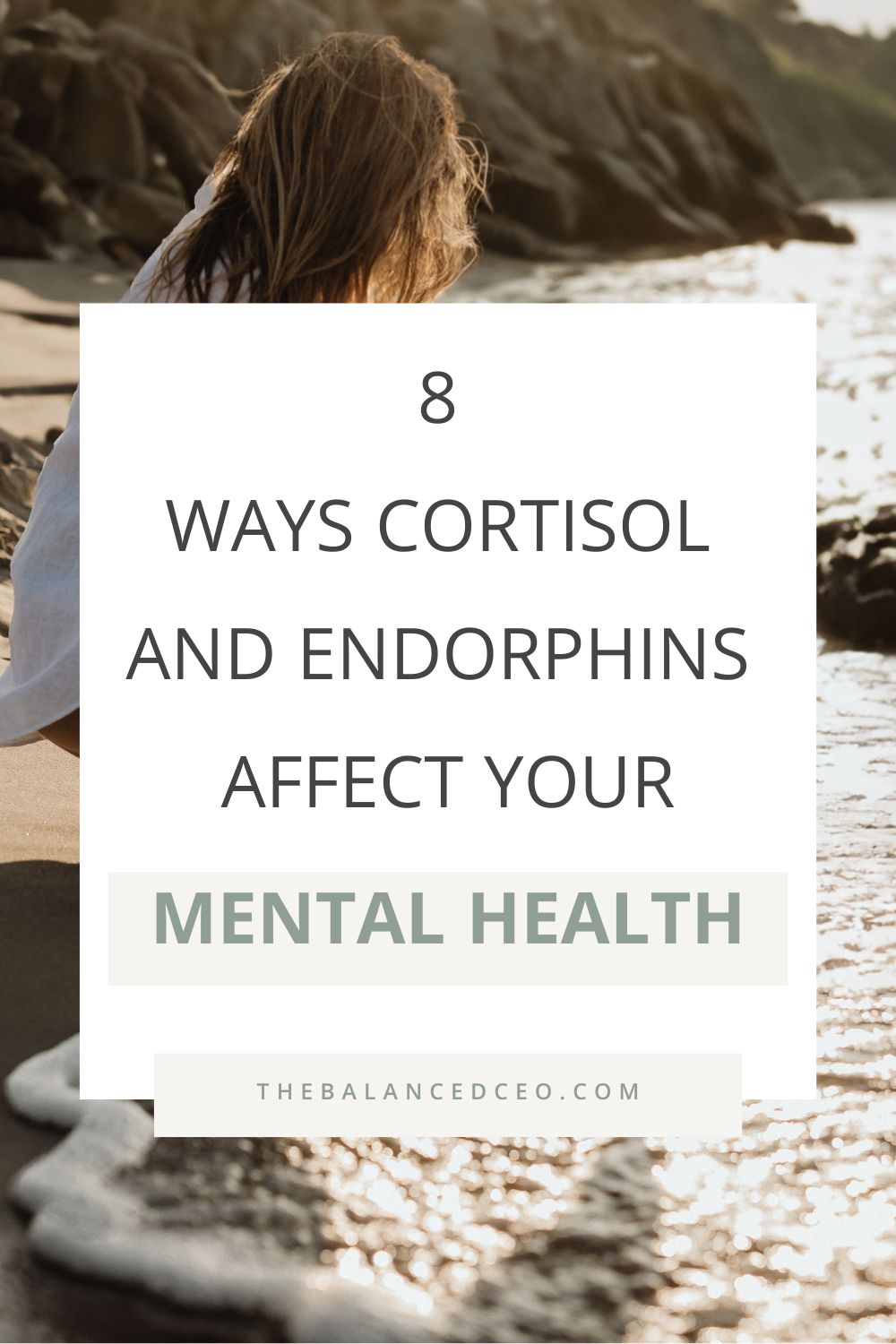This post may contain affiliate links, which means I’ll receive a commission if you purchase through my links, at no extra cost to you. Please read full disclosure for more information.

While circumstances play a significant role in our mental health, our biology does too. Our bodies and brains can help us to feel good and enjoy a better sense of well-being.
Cortisol and endorphins are two of our body’s key mental health regulators, and they’re the driving force behind how we feel.
Cortisol is often dubbed the “stress hormone,” and endorphins are the “feel good” chemicals, so it makes sense that they play an important role in regulating our mood and mental state.
Here’s everything you need to know about these two biological regulators and how you can ensure yours are doing their job.
What Are Cortisol And Endorphins?
Cortisol is a steroid hormone primarily known for its involvement in the body’s stress response. When we perceive a threat or stressor, our body releases cortisol, triggering a “fight or flight” response.
This hormone prepares the body to face challenges by increasing blood sugar levels, suppressing non-essential body functions, and sharpening our cognitive abilities. While this chemical plays a vital role in our survival, chronic elevation of cortisol levels can adversely affect our mental health.
Endorphins are neurotransmitters produced by the hypothalamus and pituitary gland, both situated in the brain. They derive their name from two words: endogenous (inside the body) and morphine (opiate painkiller). These feel-good chemicals are natural pain relievers. Beyond pain relief, endorphins serve as mood boosters and can create a sense of well-being.
Now that we’ve defined these chemicals, let’s dive into the ways they affect our mental health.
1. Stress and anxiety regulation
Cortisol plays a critical role in regulating our response to stress and anxiety. In the face of a temporary threat or stressor, it helps us stay alert and focused. However, chronic stress can result in permanently high cortisol levels, contributing to the development of anxiety and depression disorders and worsening existing ones.
2. Mood Enhancement
Endorphins are natural mood lifters. They induce feelings of pleasure and euphoria, helping to alleviate symptoms of depression and anxiety. Engaging in activities that trigger endorphin release can be an effective strategy for improving mental well-being.
3. Pain Management
Both cortisol and endorphins are involved in pain management. Cortisol can help relieve pain by reducing inflammation, while endorphins are natural pain relievers. Together, they provide a balanced pain management system and contribute to a sense of comfort. Chronic pain can lead to depression when cortisol and endorphins are not optimal.
4. Sleep Quality
Our cortisol levels are highest in the morning and lowest at night. This natural fluctuation helps regulate our sleep-wake cycle. However, consistently high cortisol levels associated with chronic stress can disrupt sleep patterns, leading to insomnia and related mental health issues. Lack of sleep at its best can cause irritation and, at its worst, can result in anxiety, depression, and other disorders.
5. Cognitive Function
In moderation, cortisol sharpens cognitive abilities, enhancing our problem-solving and decision-making skills. However, prolonged exposure to high cortisol levels can leave us struggling with memory problems, brain fog, poor concentration, and even cognitive decline.
6. Mood Enhancement
Endorphins, our natural feel-good hormones, help to regulate our emotions and improve our mood. Engaging in activities that stimulate endorphin release, such as spending time with friends, exercising, and even eating certain foods like dark chocolate, can help us cope with stress, depression, and emotional imbalances.
7. Immune System Regulation
Cortisol plays a role in immune system regulation. In times of stress, it temporarily suppresses non-essential bodily functions, including the immune system. While this is helpful for short-term survival, prolonged suppression can lead to illness and infections, impacting our mental health indirectly through physical health issues. Chronic illness can cause depression and related mental health issues.
8. Hormonal Imbalances
Our hormones are chemical messengers that tell our bodies what to do, when to do it, and for how long. When our hormones, like cortisol, are out of sync, it can cause mood swings, anxiety, depression, and other mental health issues.
Managing Stress To Maintain Our Mental Well-Being
Our modern-day lives can be extremely stressful.
Evidently, these struggles elevate our cortisol and inhibit the release of our happy hormones, the endorphins, potentially leading to mental health problems like depression or anxiety.
Although the release of these hormones is a biochemical process, we can take practical steps to practice self-care and manage our stress through activities that release endorphins.
- Regular exercise
- Meditation
- Aromatherapy
- Sex
- Enjoy red wine and chocolate
- Indulge in a massage
- Smile and laugh with loved ones
- Have a hot bath
- Bask in the sun
- Being kind to others
- Make music or listen to it
Get Your Body’s Regulators Regulating The Right Way
Understanding the role of cortisol and endorphins in our mental wellness can help us make informed choices to manage stress, anxiety, and emotional health.
While cortisol can be both friend and foe, endorphins are our allies in maintaining our emotional equilibrium. We can do many things to relieve our stress, which facilitates hormonal balance and, ultimately, our mental health and happiness.





Leave a Reply